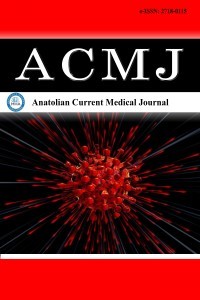
Anatolian Current Medical Journal
Yazarlar: ["Asena AYAR MADENLİ", "Naziye GÜRKAN", "Şebnem ALANYA TOSUN"]
Konular:-
DOI:10.38053/acmj.1167530
Anahtar Kelimeler:COVID-19,Women’s fertility,Anti mullerian hormone,Ovarian reserve
Özet: Aim: The possible impact of COVID-19 infection on female reproductive system is a controversial issue. The aim of this study was to investigate the effect of COVID-19 infection on anti mullerian hormone (AMH) as a predictor of ovarian response to ovarian stimulation. Material and Method: This prospective study was conducted at a university-affiliated tertiary medical center between June 2021–February 2022. The study population included 79 reproductive-aged women (22-34 years) with COVID-19 infection. Blood samples were collected for AMH levels before COVID-19 infection and after three months of COVID-19 disease. Results: The mean age of the study group was 28.11±3.49 years. Estradiol and Luteinizing Hormone (LH) was found to be lower after three months of COVID-19 disease (p<0.05). Follicle Stimulating Hormone (FSH) was significantly higher in post-COVID-19 group (p<0.05). Free T4 (FT4) and body mass index (BMI) were found to be higher after three months of COVID-19 disease but not significant (p>0.05). There was a statistically significant association between Pre-COVID-19 and Post-COVID-19 in terms of AMH (p<0.05). AMH values have decreased after COVID-19 infection in patients. There was a statistically significant association between menstrual volume and COVID-19 disease (p<0.05). According to the findings, menstrual cycle irregularity has increased after being infected with COVID-19. Conclusion: In conclusion, the results showed that COVID-19 could adversely affect the AMH level and the female reproductive system.